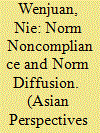| Srl | Item |
| 1 |
ID:
157813


|
|
|
|
|
| Summary/Abstract |
The article looks at China's strategic debate and confusion over the South China Sea (SCS) issue and explores why it has occurred. This article recognizes that China has not yet decided whether the SCS issue should be included among China's core national interests. Additionally, China has not quite figured out whether the priorities should be placed on the SCS claims or the Sino-US relationship. In addition, China has not worked out exactly what the Nine-Dash Line (NDL) means. It contends that identity is a key factor in informing a state's strategic concerns and policy objectives regarding the SCS. This article argues that China's dual identities force China to strike a middle ground, which causes domestic strategic debate and confusion. In the final analysis, this article tries to determine what salient implications a prevailing identity of China as a rising power would yield for its SCS policies.
|
|
|
|
|
|
|
|
|
|
|
|
|
|
|
|
| 2 |
ID:
182626


|
|
|
|
|
| Summary/Abstract |
Would existing norms be vulnerable to degeneration due to the noncompliance behavior of some members, especially that of norm entrepreneurs? Standard accounts of norm studies focus on the negative influences of norm noncompliance on norm diffusion. This article starts with a critical thinking about norm noncompliance and argues that norm noncompliance, as well as norm compliance, constitutes a normal and necessary part of our social system. It develops hypotheses on why and how norm noncompliance leads to norm diffusion. To illustrate this argument, it takes free trade norms as a case to explore the different attitudes held by the United States, European Union (EU), and China. China has been motivated by US noncompliance behaviors to take the lead in diffusing free trade norms, while the EU tries to prevent China from taking the championship, which combined have promoted the diffusion of free trade norms.
|
|
|
|
|
|
|
|
|
|
|
|
|
|
|
|